Well, it’s happened: I have reached the age where I look forward to Social Security payments arriving in my bank account every month. With that significant milestone comes some new perspectives on life with dogs as a senior citizen. Not the least of these is the sobering realization that I have a finite number of dogs left to share my life with, making each one an even greater treasure.
Just as daunting is the awareness that, if and when my husband and I do add more new canines to our family, we might need to revise our checklist of desirable adoption-dog characteristics. If you, too, are reaching your golden years or have dog-loving family members who are, you may find the following suggestions useful.
Don’t get me wrong! If you’re like me, you’re still quite agile and active. I do barn chores every day, hike with my dogs, and work 12-hour days. Check out any agility competition and you can be reassured that there are plenty of aging dog-lovers who can still get around quite handily. These tips are not just for doddering centenarians – just some of the things you might want to think about as you contemplate your future with your four-legged family members.
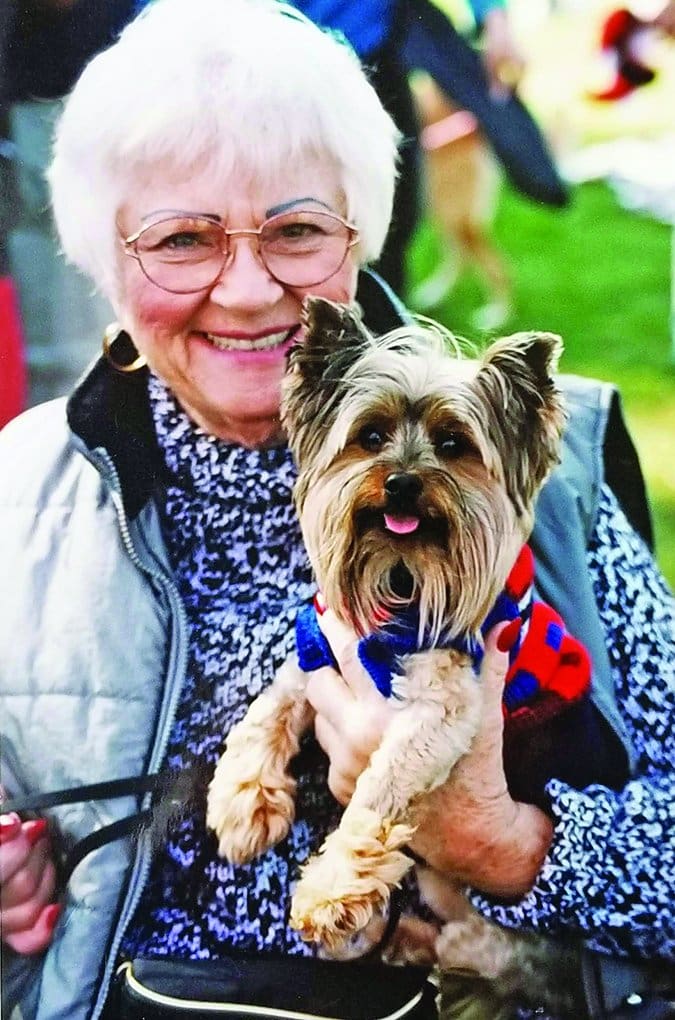
The Good Stuff
Aging with dogs isn’t all accommodations; there are lots of good things about being a senior dog owner:
■ You will likely be home more. With retirement comes more time to spend with your dogs. They will love this! So will you! If you, like me, have lots of active years ahead, you can do more training, more hiking, more playing, more cuddling, and just have more all-around fun together.
■ You might travel more together. It’s not uncommon for retirees to travel the country in a motor home, touring national parks and monuments, visiting out-of-the-way places, and crossing off bucket-list adventures.
Motor home travel is ideally suited for dogs; your dogs are cozy in their own home away from home and they get to go everywhere with you. You can even visit relatives without imposing your furry companions on them; if they don’t have dog-friendly homes yours can hang in their own space, parked just outside. You can even live in it full time and forget about those mortgage payments!
■ You could possibly qualify for a service dog. No, not that we want you to be disabled, but if you are, you could consider this an opportunity to have a super well-trained dog who could go with you virtually anywhere (with just a few very rare, limited exceptions).
Qualified dog training professionals are starting to offer more opportunities for people to train their own service dogs and avoid the high cost of purchasing a well-trained service dog. Of course, your dog has to be appropriate service-dog material – and under no circumstances should you join the sad ranks of those who fraudulently pretend their dogs are service dogs just to gain access for them.
■ Keeping a canine companion for company is good for you! An increasing number of retirement villages, assisted-living facilities, and managed-care homes now welcome companion animals, recognizing that this can improve both the mental and physical health of their human residents. Having an animal companion helps ease loneliness and stress, and animal-care tasks keep residents more active and social. If and when that time comes, you should be able to find a facility that will welcome you and your dog.
Cautions for Seniors Raising Dogs
So, what’s the down side? Here are some of the not-as-fun things to think about as you approach your golden years with dogs.
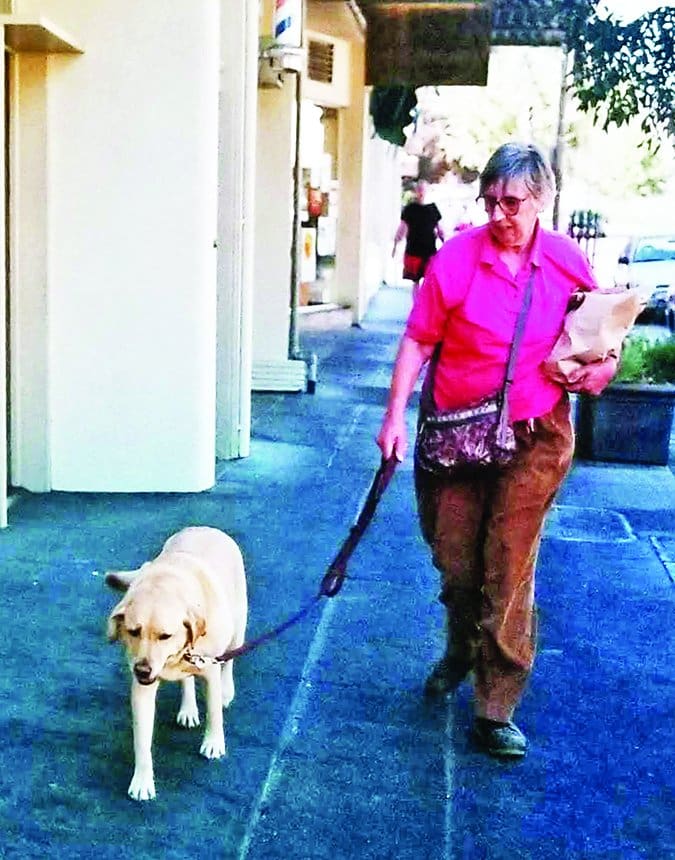
■ Providing proper care for dogs can be costly. Unless you’re one of the minority of Americans who have planned adequately for luxuries in your retirement years (kudos to you if you are!) the expense of caring for a dog can overwhelm a tight budget.
Top-notch pet insurance programs can help offset some of these costs, but it’s something to keep in mind as you consider how many (or how many more) animal companions you can reasonably provide for. It would be devastating to have to give up your beloved dog because you can’t afford to care for her!
That said, some expenses (such as pet-sitting/walking and doggie daycare) might decrease after retirement and help offset the cost of your dog’s medical needs.
■ Seniors must be sure, more than ever before in their lives, to make good adoption choices. If you’ve had Labrador Retrievers all your life, and lose your beloved 15-year-old Festus to old age when you are 70, you might automatically think to get another Lab puppy. After all, you’ve always had them!
Remember, however, that you were a spry 55 years old when you adopted Festus, and he ran you ragged then, until he grew up and became perfect. It’s easy to forget how hard Festus pulled on-leash as a youngster, but you likely remember how much your arthritis hurts on some days; that might not be a good combination.
Again, I empathize. When my husband and I were looking to adopt recently, a dog-trainer friend told us about one of her clients who was looking to rehome his large, active German Shepherd. We considered it seriously; my husband loves GSDs. But in the end, we adopted a Pomeranian-mix, Sunny – and we are very happy with him!
If you’ve always been a “big-dog person” it might be time to think smaller. You may have more and more physical limitations – could you still lift an injured big dog into the car if you had to? And if you think an assisted-living facility, or even just a downsized home in a condominium complex, might be in your future, be aware that both often restrict the size of the dogs they will accept.
On the other hand, be aware that very tiny dogs (especially tiny dogs who are very zippy and active) can be a tripping hazard for a slower adult, or one with mobility challenges, so keep that in mind as well.
Dog Training and Equipment Tips for Seniors
Now for more good stuff. Think of all you can teach your dog, with all that time on your hands! Even if you don’t need a service dog, yours can certainly help you around the house – finding, picking up, and bringing you things, closing doors and drawers, and more.
A good trainer can help you with these and other tasks you’d like your dog to learn. Some trainers even offer classes specifically for older humans, where the pace of the class might be a little slower, and the focus is on helping to meet the training needs of seniors!
In-Home Professional Training
If you need help with training and can’t attend a class because getting out of the house is hard, there are many good, positive trainers who will come to your home. Just be sure, as always, to research them carefully to make sure you’re getting a bona fide force-free trainer who will help you train your dog without hurting or scaring him.
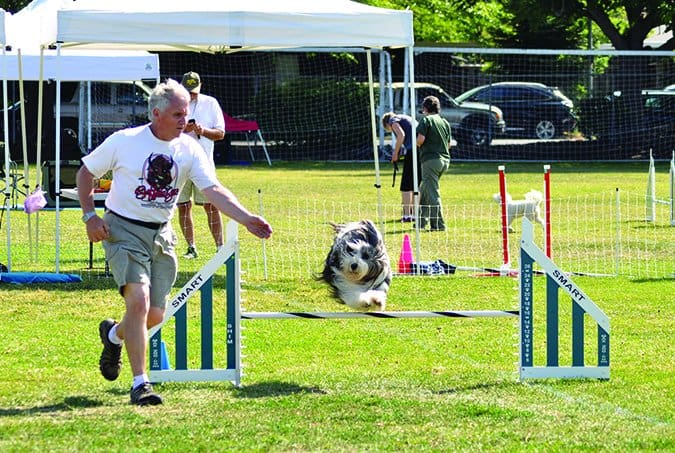
Front-Clip Harnesses
Of course, the right equipment can also make life easier for our aging bodies. Front-clip harnesses can ease the pain of leash pulling; even smaller dogs can sometimes pull surprisingly hard!
Waist Belt
Also useful for seniors (or anyone with arthritic hands) is a waist belt that allows you to clip your dog’s leash to the belt. This transfers the dog’s pulling pressure to your hips, which are sometimes sturdier and more stable than your back and shoulders – but only if you are stable enough and your dog isn’t big enough to pull you over.
The High Sierra Walk-A-Belt from White Pine Outfitters is a good choice for a waist belt.
Bungee Leashes
A leash that has some give or stretch can also reduce the impact on you if your dog runs to the end of the leash. One style that tends to work well for absorbing leash shock is the Dog Outdoors Ezy Dog Zero Shock leash.
Waist Belt AND Bungee Leash!
Ruffwear sells a waist belt that comes with a stretchy leash. See our review in the August 2018 issue.
Elevate Your Dog Training
Bring the dog up closer to your level. Here’s another benefit of downsizing to a smaller dog: You can pick her up or invite her to jump up on an elevated surface (such as a sofa, bed, ottoman, or a table provided for this purpose) and do much of your training there! Dog steps and/or ramps can be useful if she can’t jump high enough and you can’t pick her up – or she doesn’t like being picked up.
Deliver Treats on a Stick!
Finally, something as simple as peanut butter or baby food smeared on a long-handled wooden spoon can ease the delivery of treats to a small dog without having to bend over.
Seniors for Seniors
As you look to adopt, consider the mature canine residents at your local shelters and rescue groups. When you adopt an adult dog you get to skip all the crazy-puppy-behavior stuff and often (although not always) get a ready-made companion. Plus the older dogs often have a much harder time finding a forever home, which is just nuts, because many senior dogs fit into their new families seamlessly.
One of the best adoption choices I ever made was an eight-year-old tri-color Rough Collie, surrendered to my local shelter due to urinary incontinence (which was easily treated). I offered to foster Mandy. She walked into our house and lay down on the floor like she’d always lived there, and never put a paw wrong for the remaining six years of her life with us. In contrast, Sunny, adopted at 11 months, still indulges in adolescent high-energy crazies, chews things randomly, and has an occasional house-training lapse.
Helping Senior Family Members
Perhaps you aren’t in the senior category yet, but you have friends and family members who are. There are countless ways you can make life easier for your aging dog-loving friends and relatives:
- Make a standing offer to help with transport as needed for vet visits, groomer, training classes, etc., or help them find good mobile vet, training and grooming services that will come to their home.
- Either offer to help exercise their dog, or help them hire (and perhaps pay for) a professional dog walker for at least a few days per week.
- Do some or all of the training yourself, if appropriate and needed.
- Assist them with setting up a regular order of pet supplies from companies like Chewy.com that will auto-ship repeat deliveries.
- Help them make good choices if and when they are contemplating adding new animal companions to their family.
- When the time comes for assisted living, research facilities that allow animals and help them select an appropriate new living situation.
- Have the difficult discussion about planning for their dog’s future, and help them make those arrangements.
Caring For Your Dog After You’re Gone
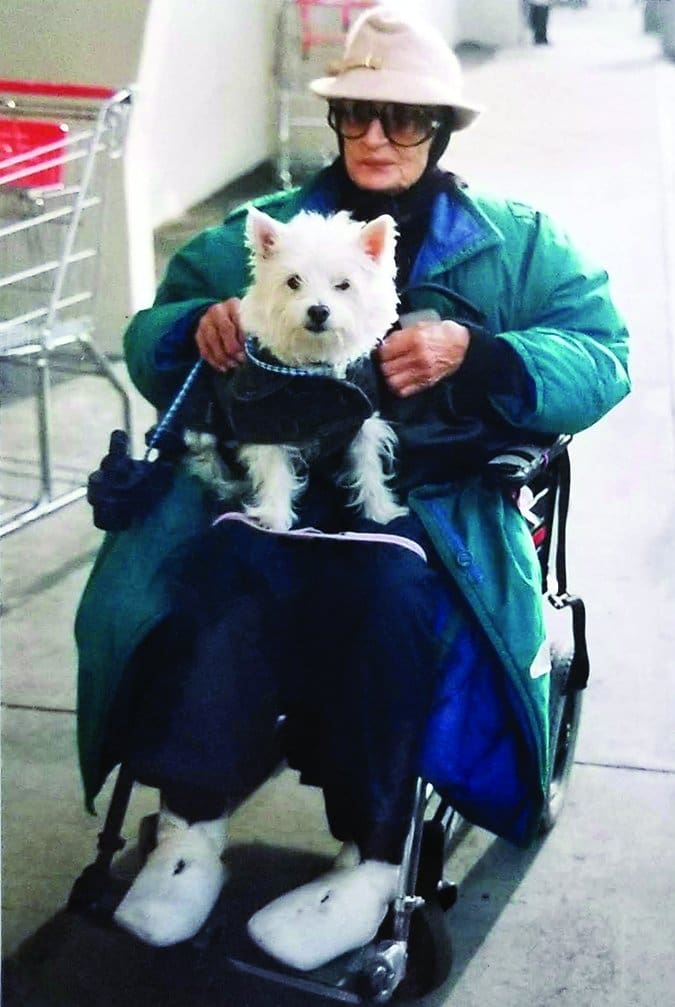
I’m not sure which is worse: contemplating my final years with no dogs in my life, or having my dogs outlive me. At some point you might decide it’s not fair to adopt any more, either because you’re no longer able to care for one, or your living situation doesn’t allow – or simply because you don’t want your dog to outlive you. I cannot conceive of not having a dog in my life, so fortunately, there are several different ways you can ensure that your dog is cared for after you are gone. You can guarantee this – and give yourself peace of mind while you’re still here – by taking one or more steps to provide for her future:
1. Consult with your retirement advisor.
Pet trusts, pet protection agreements, and provisions in your will can ensure that your dog will be well taken care of after you are gone. Forty-six states (all except Kentucky, Louisiana, Minnesota, and Mississippi) have enacted pet trust laws. Your retirement advisor will have more information regarding the specifics in your state.
2. Provide for your dog in your will.
Who do you want to care for your dog? Check with friends and family members before you designate them for your dog’s care in a will. They need to be willing and able to care for her the way you want her to be cared for. If you plan to leave her in the care of a non-profit animal protection organization, research the group very well first. Some charge a fee for this service, and again, you want to be sure your dog will receive good care. People have been known to take the money and then neglect or even euthanize the dog.
3. Set up a pet trust.
A pet trust is managed by a trustee – someone you select to manage the money you will place in the trust – and a caregiver who is the person selected to care for your dog. The trustee disperses resources to the caregiver who will then use them to care for your dog in the manner you’ve described in the trust. Pet trusts are expensive. You must fund the trust (typically at least tens of thousands of dollars) and pay lawyer’s fees that can easily top one thousand dollars. For more information visit ASPCA.org/PetTrusts.
4. Write an agreement.
In lieu of a will or trust, you identify one or more caregivers and write out an agreement that states that this person will care for your dog upon your death or inability to care for your dog yourself. The biggest advantage of this is affordability. Make sure you discuss the arrangements with your designated person(s) first. You can obtain a standard form Pet Protection Agreement at LegalZoom.com for a cost between $39 and $79, or you can write the letter yourself, and have it signed (by both you and the caregiver) and notarized. Make sure that your vet and close family members have a copy of this agreement, so they will know who to give your dog to if something happens to you.
5. Research continuing pet care programs.
Some animal sanctuaries, humane societies, and veterinary schools offer programs to care for your dog if you can’t. Programs guarantee food, shelter, and state-of-the-art medical care until your dog can be adopted by another family. You will probably pay a one-time fee for your first dog and an additional fee for each additional pet you place in the program. To find a program near you, do an online search for “continuing pet care,” or ask for a referral from your veterinarian or local humane society. A big caveat here – your dog may end up spending the rest of her life in a kennel in a shelter if she doesn’t get adopted. Think carefully about this one.
6. Leave readily available information about your dog.
Carry a wallet card that will tell someone that you have animal companions and who to contact to see that they are cared for. In the case of emergency or sudden illness, make sure family members know where to find the basics:
- Contact information for your veterinarian.
- Any special medications or medical issues.
- Food that your dog eats.
- Favorite toys and sleeping places.
Enjoyable Age Adjustments
I’m working on the aging thing in my own world. I’ve actually signed up with Sunny for our new program here at Peaceable Paws, to help owners train their own service dogs. Not that I’m anywhere needing one yet (I hope!) but just for some fun and interesting things to train.
And I’ve accepted that my lifetime dream of having an Irish Wolfhound will probably never come to pass. Ah well, with our 30-pound Kelpie (Kai) and the 20-pound Pom/Eskimo-mix (Sunny), I’m happy to settle for smaller these days.
Author Pat Miller, CBCC-KA, CPDT‑KA, is WDJ’s Training Editor. She lives in Fairplay, Maryland, site of her Peaceable Paws training center. Miller’s newest book is Beware of the Dog: Positive Solutions for Aggressive Behavior in Dogs.


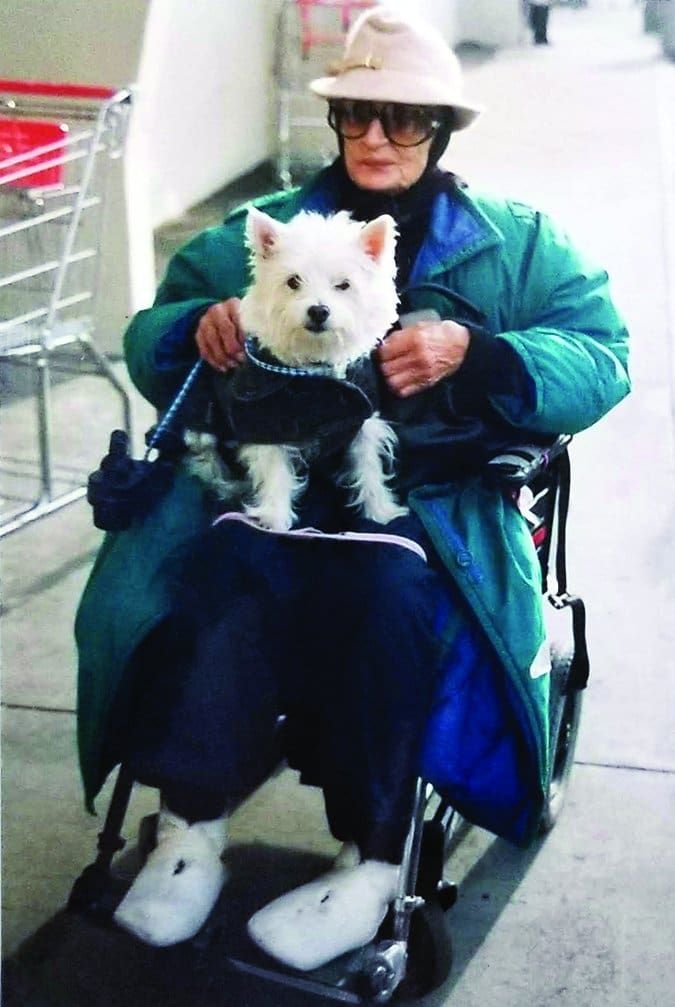




This is a comprehensive, excellent article! Thank you from a 67-year-old dog lover.
My husband and I have decided what we intend to do after our current generation of dogs has gone: we’re going to adopt senior dogs. That way the odds are that they will not outlive us (but we also provide for them in our will, so they will be cared for even if we go first), and we will give a loving home to an older dog(s).
This makes sense to me 🙂 I don’t ever want to live without a dog, but I don’t want to leave a dog to ‘rescue” 🙁
I reason that even IF the dog outlived me I’d have given it a few good years.
I am rather feared by the future — we currently have THREE dogs going on 10. One of them in sot a good candidate for introducing another dog to. Our number three dog is a rehomes dogs (not truly a rescue) and the two girls do need to be constantly supervised when together.
Wonderful article! I found a good waist belt and bungee leash on Amazon for $17 (Sikoon), more affordable than the $75 set-up (albeit much better quality) from Ruff Wear. Since I don’t run trails, the less expensive option will last at least two or three years.
We’ve adopted adult dogs for a number of years. I’m disabled, and as my condition has progressed I’ve been more and more interested in a service animal, but can in no way afford one. I do have two Golden Retrievers, one 2 yrs, the other 4 yrs who might be candidates with additional training, but I’m not capable of doing it. I would LOVE to see an article specific to this!
I want to strongly endorse putting any advance directive for your pets in writing and make sure to give copies to many people. For years I cared for Mocha when his diabetic dad was hospitalized. His next door neighbor knew of our arrangement and brought the dog to me each time Michael was hospitalized. I agreed to take Mocha in the event of Michael’s death, and the neighbor knew this, too. When it happened, because Michael died at home and wasn’t discovered for several days, the police were called and despite the neighbor’s telling them I was to take Mocha, the officers took him to the shelter. I didn’t learn of Michael’s death for over a month – and only because folks at the shelter know me well was I able to immediately claim him. The officer’s excuse? “Someone in Michael’s family might claim him.” Michael had no family, the neighbor knew this and informed the police – but SOP prevailed. Somehow the information that I was designated to take Mocha was never reported to the shelter. I did finally get him, but the poor dog had been traumatized and was grieving and ill. So easily prevented with written instructions!
Thank you. A similar situation and problem developed in my neighborhood recently. This is a great place for your warning!
Thank you, Laurie Raymond, for posting this story. I didn’t realize local procedures could result in this outcome. This was very helpful!
We adopted our Shih Tzu puppy when I was 64 a year before my planned retirement. The thinking was that we could train him while we had the energy (the wife was home full time) and then drift into retirement. It was a great decision. As he approaches 7 and we approach 71, he is a huge part of our lives. Warning – maybe morbid thought coming- when we made the decision I looked at the breed’s life span and our own expectancy and the inevitable could be in the same neighborhood. Our daughter (who he dearly loves) will take him if the need arises. But as the article says, planning is very important.
Another option to owning a dog is fostering. I;m 72 and foster Dobermans–both puppies and adults. There are many rescue groups begging for foster homes and they generally supply medical care, food and crates or other supplies. There are rescue groups for almost every breed–search for your favorite breed rescue and help them if you can’t own one of your own.
This is a very good article. As I find myself also aging with 2 young minnie Aussies, I resonated with what you pointed out and have come to many of the same conclusions. Thank you for sharing your wisdom.
Great article! We have added dogs to our lives as we have entered retirement, and I am happy to say that they are ALL certified therapy dogs. We visit senior living facilities, and take part in children’s reading programs, as well as do a variety of other pet therapy volunteer work. There are thousands of us seniors doing this in the US and across the world. It combines our love of dogs with caring for our community, so is good all the way around.
Great article (as always), Pat. Thanks very much.
If you know one of your family members will be taking your dog if he/she outlives you, it’s worth considering making them a co-owner now. That’s particularly helpful if you live in an area where animal control will only release a dog to the registered owner. There are a number of situations where first responders might end up sending your dog to animal control while you were taken to the hospital. having a co-owner who can show up to retrieve the dog can significantly reduce the time and paperwork involved in getting the dog home again.
So, we have already downsized, aost 6 years ago, after the 3 pups passed, one by one, we adopted our 9 mo. old little scruff named Leya. She now weighs about 20 pounds. She’s been the only child for almost 7 years. Then a dear friend had an avalanche of sorrows in a period of a month. She lost her husband, one of two dogs and was in hospital herself. Her housekeeper took the other dog home with her until our friend would come home from the hospital. She couldn’t be home alone, and ended up in assisted living. We took Nathan, just a wee little 10 pound pup, and just 6 months younger than our Leya.
It’s been a real wake-up call for us, thinking about all our friend went through. My prayer is that both pups pass before we do, even though they have a home to go to should they outlive us.
I am printing out and laminating several credit card size copies of what to do and who to call for both of our wallets, and for the cars as well.
Thank you for this wonderful article, a few good things I hadn’t thought of that I now plan to implement.
I am 80 and have adopted two Greyhounds in the last 10 years. I think they are perfect for seniors! Neither of my dogs ever barked. They slept about 20 hours a day unless I chose to play or walk with them. They are so loving and very smart as well as beautiful and great magnets for meeting new friends. Get one or two you won’t regret it!
I have 2 seniors, both rescues from people older than I (80) and they are ideal. The older of the 2 has arthritis and I have to “make” her walk to keep her at least a little limber. The younger, at 13 +/- is still very active and we are just finishing a basic obedience class-=-good for both him and me. I have always done performance events with my dogs and have missed the excitement, so even a beginners’ class has been a lot of fun. He and I do our “constitutional” every morning after the old girl has had her exercise and I try to walk a mile. He would like to go farther. LOL
Your section about service dogs was misleading. You must be disabled to have one plus it must be trained for public access. It costs alot of money whether a program dog or one that is owner trained with the help of a professional dog trainer.
Sorry I misread or missed some of the article. Yes it was covered as to disability and costs.
Good article. As I get a bit older, my plan is to start fostering dogs. I will volunteer to take older, less adoptable dogs. That way if something happens to me, I will be tied in with the rescue organization who can look after the dogs. The thought of dying and my animals going to a shelter to be euthanized haunts me! Right now I have family who would care for them but, since I’m the youngest, that may not always be the case.
As a now-retired estate planning paralegal of some three decades I would strongly urge people not to do their estate planning from internet documents – especially when it comes to formalized planning for pets. Each state has different laws and you (or worse, your survivors/heirs) may well find that the so-called “pet trust” you had paid a dot com biz a few dollars for is not legal in your state. Many senior centers or community centers with senior service staff or volunteers can get you to an affordable estate planning attorney who doesn’t charge “thousands” of dollars. There are also estate planning attorneys who have sliding scale fees for estate plans where seniors are on a budget. Maybe consider not waiting until you are a senior to start your estate planning!
Perfect article at a perfect time!
We lost both our older dogs (a rescue terrier and a Vizsla) three years ago, and knew we wanted two more similar. But I was 68 and he was 77, so there was a lot of figuring how much activity we could provide, and how long we would be able to care for dogs and keep our current living arrangements. Fortunately, I am still able and relatively active, but I first researched rescue terrier mixes and rescue Vizslas, finding a 2 year old 35 lb. terrier mix that was perfect for us. Shecame with many life issues, but we are experienced owners with good positive behavior connections, and so rewarding for us all. Despite searching for a rescue Vizsla, our previous Vizsla’s breeder serendipitously welcomed a litter, the day after we lost our aging V to cancer.
However, We are now fostering a 13 year old Vizsla girlie, the sweetest doggo ever, so have firsthand chance to recommend seniors for seniors! She fits in well with my creaky knees, husband’s health issues, and our retirement “schedule”. She is perfect, and her new owners will experience the grateful love of an older Velcro Vizsla! Please give seniors a chance!
Excellent article. I love your positive tone as you lay out the pros and cons. Thank you.
Thank you for putting all this together. One suggestion for someone who may have become dog-less & miss their companionship, try fostering. A limited time commitment so you can still take vacations. Low/no cost cause rescues usually pay for food, medical, training.
Thought those of you who are dog lovers and seniors (generally age 65+) might enjoy this helpful article from The Whole Dog Journal. I am 71 years old and have always had large dogs (primarily five Golden Retrievers and a German Shepherd). When my Rowdy, a Golden, passed to the Rainbow Bridge a year ago September 2018, I knew I wanted another dog or two or…??? I, also, knew that raising a large dog from puppy hood was probably more than I could handle, what with my aches, pains, etc. So I decided to become a foster mom and began taking care of a fearful 3 year old female Beagle mix who came from an abusive situation. Well, Lily has been with me since May 3rd and despite some challenging problems, we have made a lot of progress. But, I have fallen absolutely in love with her. Friends have called our meeting as love at first sight for both of us. She will become my very own furry kid as a Christmas present to us both this December. If you are a senior and you’ve been considering bringing a new dog into your life, I think this article might be very helpful. Happy Dog Loving!!! Hugs.
Responsible breeders will take back dogs they have bred and rehome them carefully. Not only can this insure that your dog will be well cared for if you can not take care of him, but is a place to find an older dog if you want to stay with the breed.
Wonderful article and right along with the plans my wife and I have been discussing. We are in our 70’s and our current dog is 12 years old and has health problems. We will love and spoil him until his time comes before we head out to the adoption facilities, We will be looking for a middle-aged dog a little smaller than what we’re used to for the reasons cited.
Thanks for posting this article and thank you to all that shared information. I am 70, single, still work every day and have a lovely, sweet, never barks or bites 4 lb Chi (13), a 30 lb male Basenji that was my fathers and he is about 13 still a handful. Recently, Aug 1, 2019 Shadow – Lab 13 passed away, old age. I thought that I would not get another dog, certainly not a Lab. The household did not run as well as with the Lab. Storm Imelda came through on the Texas coast and a 8-10 yr. old female Lab with heartworms needed a home. Yes, I gave in and adopted her, my B (deaf) is much happier because he watches her for whats going on in the house and the yard…she is fitting in nicely. If something happens to me the vet will rehome the Lab, the Chi will go to my dog sitter who has contacts in the Collie community and has found homes for other seniors. and the B… I just don’t know, only a veteran B owner could handle him. God Bless Us All!
NOTE:
Do NOT use a waist belt. They will dramatically increase the risk of back damage.
Use a broad belt ON YOUR HIPS if you must. Personally I like the option of letting go of the leash. But preferable no leash at all. Just a trained dog 🙂
I like your recommendation to use a stretchy leash that attaches to your waist. My mom is considering getting a small dog that is easy to care for. We’d probably consider going to a veterinarian for a full check-up on whatever dog we consider getting.
One thing to remember is that each dog has a different personality. I have a 19mo. old Cavapoo and she is darling. She loves agility and is low key otherwise. Our second dog is now 6mo. also a cavapoo and she is a spit fire. I know that she is much a puppy yet but she has different parents than our first and I think she just overall has a lot more energy than our first at the same age. We have brought her to classes and she is the valedictorian of the class. BUT… she also continues to wear us out keeping her occupied and our first dog has been adjusting to her but she is a little much for her at times as well. Both my husband and I did the training but he gives in A LOT more than me. Consistency is key when having two dogs. We are 66 and 68 and still able to deal with some of this but going forward if the little one doesn’t slow down I’m afraid we won’t be able to keep up with her. Something to consider when getting two dogs. We did ….and we thought the 2nd would be much like the first…not so.